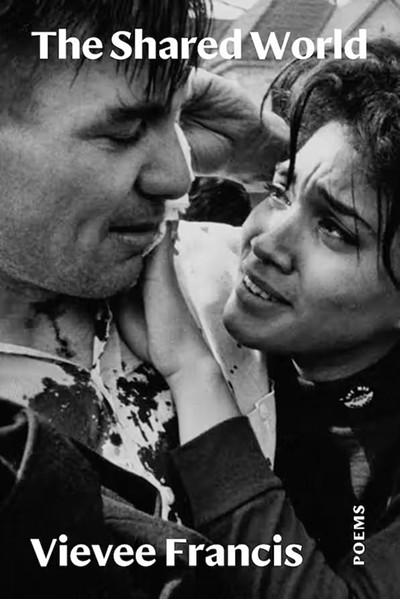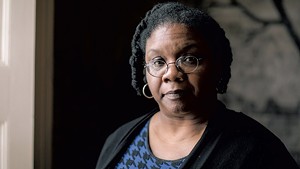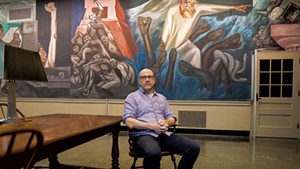
- Sarah Cronin
The cover of Vievee Francis' new poetry collection, The Shared World, bears the image of someone Vermonters may recognize: Galway Kinnell, the late Sheffield resident, Pulitzer Prize winner and state poet of Vermont (the office now known as poet laureate) from 1989 to 1993. In this photo he is younger, bloodied by a trooper's club on March 16, 1965. Kinnell had traveled from Pennsylvania to Alabama with student organizer Harriet Richardson, who can be seen comforting him, to join the march from Selma to Montgomery led by Martin Luther King Jr.
The book's title comes from the climax of the poem "Gate A-4," by Palestinian American writer Naomi Shihab Nye, in which the poet bears witness to communal kindness in the bleak setting of an airport waiting area.
Francis sees Kinnell and Nye as powerful influences on her own work. "Two, among others," she said, "moving within and across cultures."
The Shared World is the fourth book of poems from Francis, 59. Born in Texas and now living in White River Junction, she is an associate professor of English and creative writing at Dartmouth College. Her third collection, Forest Primeval (2015), won the $100,000 Kingsley Tufts Poetry Award and the Hurston/Wright Legacy Award, named in honor of Zora Neale Hurston and Richard Wright. In 2022, Francis' libretto for The Ritual of Breath Is the Rite to Resist, an opera by composer Jonathan Berger, premiered at Dartmouth College in Hanover, N.H., and Stanford University in California.
Francis' literary style could be called omnivorous. She has read widely, and the echoes of older poetics, such as those of Shakespeare, William Butler Yeats and Robert Frost, are audible in her work, alongside and entwined with rhythm-and-blues cadences. With an exceptionally broad aural range, she moves rapidly through varied dictions and different rhetorical strategies as a poem unfolds on the page. Unlike many of the poets of our time, who use syntactically fractured phrasing, Francis clearly loves sentences.
"I do!" she said with a laugh, sitting with Seven Days in the parlor of the Norwich Inn.
Her reader hears an exuberant playfulness with syllables, words and clauses, even when a poem is thematically very serious. And Francis' sentences wrap and flex across the verse lines.
"I think this is central to my craft," she said. "If I'm writing about a particular topic that draws a good deal of sorrow from me, I want a good deal of sorrow drawn from my reader, so it's up to me to find a way to use the language to do that.
"No matter how hard I try, I can't get the poem to act in ways music does, with emotional immediacy," she continued. "For any poet, it's Sisyphean, isn't it? We don't get to the end point, because the writing is not experience. Yet we keep trying."

- Courtesy
- The Shared World by Vievee Francis, TriQuarterly, 144 pages. $22.
Francis talked about the peripatetic route to publication of her new book. "I was born in San Angelo," she said, "which is West Texas, culturally. My father was born there, too. This is where my family on my father's side has been since slavery."
The family kept moving — to Georgia, Texas, Michigan, and bases such as Fort Sill in Oklahoma and Fort Ord in California, since Francis' father was in the military.
"Monterey, when I was 4 and 5, perhaps had the strongest impact on my life," Francis said. "It was 1967 to '68. I was coming from the South. And there I found myself in this incredible place. I remember snails crawling up the windows. The smell of ocean air. It was marvelous.
"I was on the beach, and I didn't know the people I saw there were 'hippies' — I just knew these were people who were white who weren't disparaging me or trying to kill me. I could look in their eyes and nobody would slap me and say, 'Don't look!' in a white woman's eyes, as one of my elderly relatives did. I could be myself.
"Had I only seen Southerners of the era of Jim Crow — I was born into Jim Crow — I wouldn't be the person I am today," she continued. "Those loving, beautiful people, about the age my students are now — they were still children themselves, and they wanted to be free in their estimation of what freedom was. I didn't feel judgment, whereas there was no place I could go, where I was from, where there wasn't immediate judgment. And swift punishment."
Francis eventually enrolled at Fisk University in Tennessee, completing her BA in 1990. Then, for more than 15 years, she led what she calls "off-the-grid," community-based writing workshops for youths and adults in Detroit.
"I became a professor quite late," she said. In 2009 she earned an MFA in poetry from the University of Michigan, and in 2012 she moved with her writer husband, Matthew Olzmann, to North Carolina, where she taught at Warren Wilson College and North Carolina State University. She came to Dartmouth in 2016.
In her writing, Francis locates personal incidents and situations within a world-historical dimension that may remind a reader of Eastern European, Latin American and Indigenous poetry. She places the "I" that narrates many of these poems in relation to a larger social realm, directly implicating history — local, regional, national and global.
"I'm influenced by the Polish poets: [Wislawa] Szymborska, [Czeslaw] Milosz, [Adam] Zagajewski," she affirmed. "I never deny my lineages. Am I part of Gwendolyn Brooks'? Absolutely. But am I part of Szymborska's? Absolutely!"
She has developed and taught a course on the poetry of postwar Poland.
"To Dartmouth's credit, they're one of those rare schools that will allow an African American to teach what they know," Francis said. "I taught at a school that will remain unnamed, and they told me, 'Well, you can teach urban poetics, or Black poetics, or African American poetics.' And they literally said that if I did not put the word Black, or something close, into the title of my course, I would not be allowed to teach it. Dartmouth urged me to teach what I know."
Like her previous collection, Forest Primeval, the new book has extraordinarily vibrant evocations of the natural world.
"Nature frightens me," Francis said. "I just lean into my fear."
In the poem "Birdsong like a Child's," a child has a terrifying encounter with a crow: "the bird buried in her nape its talons and / burrowed its beak into her nap, its head bent." Francis uses ellipses vigorously in this poem, to pace the narrative:
... the county held a field and
the field held a farm...
... a boy held a hound by the collar
as the hound held a bone in its mouth...
... a crow caught the eye of the girl and
the girl held its gaze...
"That poem took a long time to write," Francis said. "And the ellipses came later. I cut some of the sentences off. I couldn't find the image. I needed more succinct statements."
Francis actually had a similar experience as a girl, but for a reader the effect is fantastical, like being pulled inside a fairy tale.
"That bird looking at me was magical, but it was dangerous," she said. "I feel that around myself as I move through the world, all of the time — what feels quite magical but not unreal. Very real."
Asked about the book's cover photo, Francis said that when she encountered the image of Richardson and Kinnell on the civil rights march, she immediately associated it with the phrase "the shared world" from Nye's poem.
"Because it's sharing," she said. "And working on [my poem] '1965,' I couldn't stop looking at how he was looking at her, how she was ... This is parity. So much true kindness. So much care. The world can keep telling me everything else, but what I saw, what I know to be true: That's an ally. That's commitment. Look at her hands, placed there. It makes me cry. And this is his student. It's a teacher's love.
"Among African American poets," Francis said, "we have our own narrative about Galway, because it is my understanding that Galway was good to us. I wanted to honor that, too. I'm talking about lineage. And I'm saying no one in America gets to own it! And I'll be damned if I let people believe they can.
"This," she continued, tapping the book, "is part of his lineage. I am part of his lineage. Lineage does not begin and end with gender and race. Lineage is who we study, who we care for and who cares about us. Who speaks to us, when we write. And here's the reminder that we're connected as poets, and that's right — I've laid down a gauntlet. I get to put Kinnell on my book."
"The Lie"
The lie was told first to a friend,
a friend who would nod in agreement,
then to another friend who was ready
to do anything to bed the teller, though
the teller had no general interest in that.
The teller only wanted relief from the truth,
so the lie grew as suspicion and spread like
kudzu over the trees.
Ask about the lie and another will be told
until the truth is a woman's body under
a Puritan's stone. Of course, every dark body
is suspect. A body escaping into a night.
A body sinking into a lake edged by woods.
The lie wants to snuff out the claims
of the body. So a laughing father wraps
his charred souvenir back into his handkerchief,
the same one he uses to swipe his brow, while
his wife pretends disgust, while down the road
a cockless body swings without desire.
Copyright © 2023 by Northwestern
University. Published 2023 by
TriQuarterly Books/Northwestern
University Press.All rights reserved.










Comments
Comments are closed.
From 2014-2020, Seven Days allowed readers to comment on all stories posted on our website. While we've appreciated the suggestions and insights, right now Seven Days is prioritizing our core mission — producing high-quality, responsible local journalism — over moderating online debates between readers.
To criticize, correct or praise our reporting, please send us a letter to the editor or send us a tip. We’ll check it out and report the results.
Online comments may return when we have better tech tools for managing them. Thanks for reading.